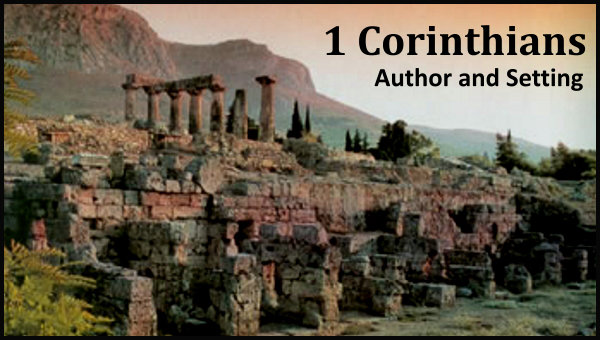By Tyson Thorne

Who really wrote First Corinthians? It’s no mystery, I’m afraid. There is so much internal evidence to confirm this epistle was written by the apostle Paul -- it bears his name (1.1), fits his style, is true to Pauline theology, and historical circumstances permit the writing of this letter at this time. Some have argued that the authors overstatement of his qualifications (stating that he is “called,” an “apostle,” by “the will of God”) is unusual for Paul and indicates that the author may be overstating his case to be believed as Paul. As intriguing as a good conspiracy theory is (which is why I’m so excited about the return of The X-Files), the conspiracy is unlikely in this case. This stressing of his authority is easily understood in light of the people’s rejection of Paul’s authority (1.12).
As for the mention of Sosthenese, we can assert that he certainly was with Paul during the writing, and may be referred to in the letter when Paul uses the term “we” in chapters one and two, but how much influence he had on the writing of the letter is unknown. Since the letter closely follows Paul’s style, it is unlikely he was responsible for writing much, if any of the letter. Possibly this Sosthenes is the same as mentioned in Acts 18.17, the young synagogue ruler who was beaten by the Jews in front of Gallio.
Though we know the church had many problems and that this letter was written in response to an official delegation sent from Corinth (1.11), Paul affirms that the church is not his but Gods (1.2) and that God is at work in them 1.5-.7). One of the evidences Paul gives of God’s work among them are spiritual gifts, a topic Paul will take up in detain later in chapter 12. Interestingly, verse seven indicates that the gifts were not for the apostolic age alone, but continue even to the present age and will continue until Christ’s return. Though it is the so called “sign gifts” that receive the most attention in modern churches, every believer has a gift and is therefore immediately useful in performing God’s work. Because all have gifts, there is no need to seek additional gifts, at least not until such a time that we always perfectly use the gift we already have. These gifts tell of an active Christian group, not a lifeless orthodoxy, nor a nominal Christian majority. The Corinthian challenge was to use the gifts in a less chaotic fashion, while the modern church’s primary challenge is to use the gifts we have in service of the body and in obedience to God’s Word. Of those whom exercise their gifts, Paul says in verse eight, “[God] will keep you strong to the end, and blameless on the day of Christ.”
The delegation had many questions revolving around issues Paul raised in a previous letter, which was greatly misunderstood and later lost. The letter we call 1 Corinthians, then, is actually Paul’s second letter and was penned sometime between CE 54 of 55. As was customary, Paul used a typical Greco-Roman letter form when writing, but mixed Roman and Jewish particulars since he was writing to a mixed audience at Corinth. One example of such a mixture is found in verse three, where he greets the believers with “grace,” a typical Roman salutation, and “peace,” a typical Jewish greeting.
The intent of this letter is to correct wrong thinking in many areas of Christian life and philosophy. Among their many problems were the mixing of Hellenist, Hellenist-Jewish, sophist and Platonic philosophies inside the church body. Their failure to make a break from the predominant philosophies of the surrounding culture caused the Corinthians to polarize to two extremes, both of which were sinful because the issue which they reacted to at the start weren’t godly. In the Words of Denver Seminary Professor and author Craig Blomberg:
All of the major problems in the Corinthian church can thus be viewed as stemming from the outworking of dualistic thought—either asceticism or hedonism. In the later category naturally appear sexual immorality (chapters 5; 6.12-.20), eating food sacrificed to idols (chapters 8-10), and drunkenness at the Lord’s table (11.17-.34), all of which indulge bodily appetites. Other alleged manifestations of freedom in Christ—asserting one’s own rights with little regard for others—probably belong here as well: lawsuits (6.1-.11), flaunting social convention with respect to head coverings (11.2-.16), and competition and chaos in the exercise of spiritual gifts (chapters 12-14). In the former category clearly appear the promotion of celibacy behind chapter 7 and the disbelief in the bodily resurrection behind chapter 15, which both deny the potential goodness of the body and its desires. Here too probably belong the inflated claims to knowledge and wisdom, as immaterial attributes, which exacerbated the divisions in chapters 1-4.[1]
Though it is difficult for Westerners to think of such issues as food sacrificed to idols as “relevant,” the underlying philosophic problems are still predominant today. Often the church body reacts to the cultures hedonism by strict adherence to rules found nowhere in Scripture (a group I have dubbed Isolationists). Still others lean toward tolerance (and in some cases acceptance) of worldly values, to their shame (these I call World Partners). The ways in which the modern church strays from God’s Word may change, but the deceptive philosophies which cause them largely do not. 1 Corinthians relevantly speaks to the modern reader as much as it did to the original audience almost 2000 years ago.
______________________[1]The NIV Application Commentary: 1 Corinthians, Craig Blomberg, Zondervan, 1994
|
|